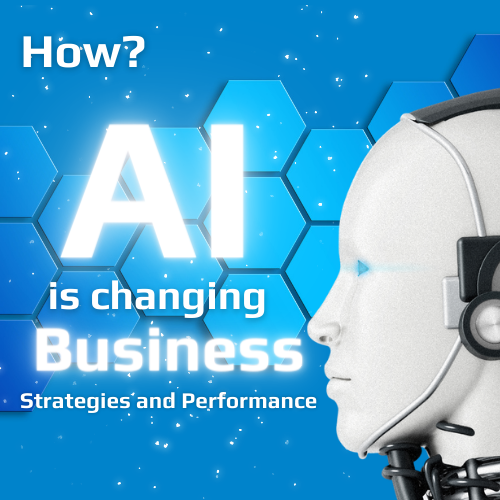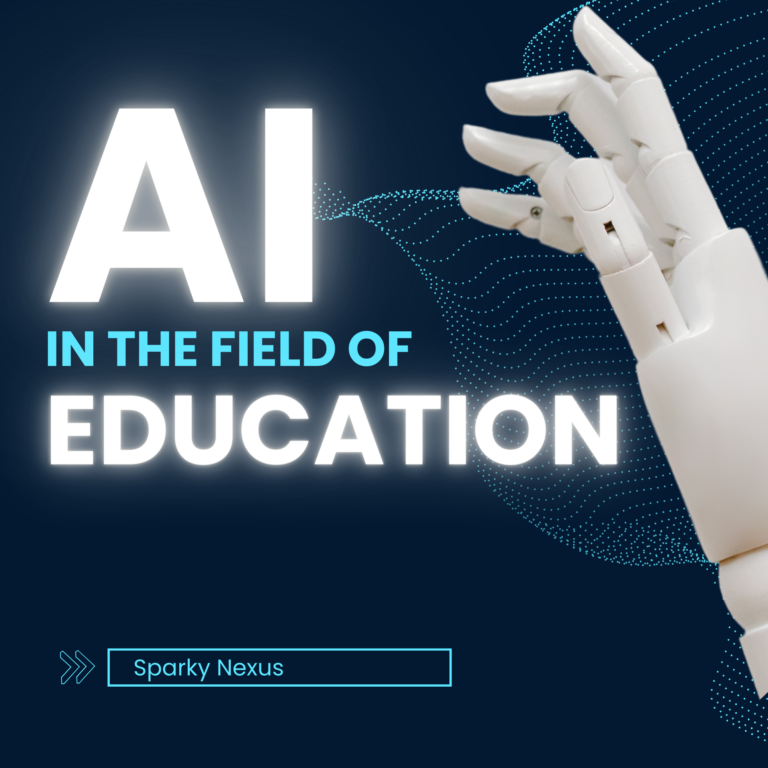Explore the use of AI in Business
Over the past few years, Artificial Intelligence (AI) has become a transformative power, fundamentally changing the business landscape globally. Its influence is profound, overturning conventional strategies and presenting unparalleled avenues for advancement and creativity. Today, Artificial Intelligence empowers businesses by assisting in lead generation, data collection, and enhancing customer experiences.
Artificial intelligence (AI) is revolutionizing traditional business strategies by making them smarter and more efficient. With AI, businesses can analyze data faster and make better decisions. It helps automate tasks, saving time and money. AI also improves customer experiences and boosts marketing efforts. Overall, AI is essential for businesses looking to stay competitive and succeed in today’s market.
Artificial Intelligence (AI) Advantages in Business
Artificial intelligence (AI) has changed how businesses work by making things easier and faster. It helps with tasks like sorting through data and understanding what customers want. AI can predict what might happen in the future and even talk to customers to help them. It also makes hiring people and managing products easier. Businesses that use AI can be more successful and stay ahead of their competition.

Understanding Artificial Intelligence in Business
Artificial intelligence (AI) involves machines simulating human intelligence processes, primarily through the use of algorithms. In business, AI finds applications across various domains, including but not limited to:
Machine Learning
Algorithms that enable computers to learn from data and improve over time without explicit programming.
Natural Language Processing (NLP)
(NLP) is a technology that assists computers in understanding human language. It involves teaching computers to read, understand, and respond to human language in a way that makes sense to people.
Examples of Artificial Intelligence in Business
Discover how Artificial Intelligence (AI) is changing many types of businesses. In healthcare, AI helps doctors predict illnesses better. Big stores use AI to suggest things you might like to buy. Banks use AI to find fraud and keep your money safe. In factories, AI helps machines work better and stops them from breaking down. These examples show how AI helps businesses in different ways, making things easier and faster.
AI in Healthcare
Artificial Intelligence (AI) in healthcare refers to the use of artificial intelligence technology in the medical field. AI in healthcare uses smart computer technology to make medical care better. It looks at lots of medical information to help doctors make better choices about treatment. This technology also helps with organizing medical tasks, finding illnesses faster, and making healthcare work smoother and faster for everyone. For further insights into the role of Artificial Intelligence (AI) in healthcare, we invite you to explore our additional blog. Click here to delve deeper into this transformative intersection of technology and medicine.
Content Marketing and Content Generation
Artificial Intelligence (AI) in content marketing and content generation involves using artificial intelligence technology to create and promote content for marketing purposes. It helps make content that suits different groups of people, like customers. This technology also makes it easier to create content, personalize it for individuals, and make sure it gets seen by the right people.
E-commerce and the Web
Artificial Intelligence (AI) in E-commerce and the web involves using smart computer programs to enhance online shopping and website performance. It helps businesses analyze customer data, personalized recommendations, and optimize user experiences. This technology also enables features like chatbots for customer support, predictive analytics for inventory management, and dynamic pricing strategies. Overall, AI enhances efficiency, engagement, and sales in the digital marketplace.
Fraud Detection and Security Measures
Artificial Intelligence (AI) helps stop cheating and keep things safe. It looks at lots of information quickly and finds things that seem strange. For example, in banks, AI can find transactions that don’t look right and stop them. It also watches how people act online to catch bad guys trying to steal information. AI learns from what it sees to get better at protecting things from cheaters and bad people.
Education and Online Learning
Artificial Intelligence (AI) helps students learn better online. It makes lessons fit each student’s needs. If a student is struggling, AI gives them extra help. It also makes learning fun with cool technology like virtual reality. With AI, learning online is easier and more enjoyable for everyone.
To sum up, these examples underscore the significant impact of AI on business practices, demonstrating its potential to drive efficiency, innovation, and success across various industries.
Benefits of AI Integration in Business
Discover how using AI in businesses can make things work better and bring new ideas. See how AI can help businesses do things faster and smarter.

Improved Decision-Making
AI helps businesses analyze data better. This helps them make smart decisions. By looking at large amounts of data, companies can find patterns and trends. This helps them make better plans and get better results.
Operational Efficiency and Cost Savings: Automation
AI uses automation to make tasks and workflows easier. This makes things work smoother and faster. It also saves money by cutting down on the need for people to do these tasks by hand. Whether it’s answering customer questions or making factories run better, AI helps save real money. AI is playing a good role in Automation that helps businesses save a lot of money.
Enhanced Customer Experiences
AI analyzes customer behavior and just recommends the products the consumer wants and is thinking of buying which makes a returning customer. This directly improves sales and has a good impact on the customer. AI enriches customer experience which results in long-term relationships.
Challenges and Important Factors to keep in mind
Ethical Concerns
When businesses use AI, they need to think about ethics. It’s important because AI might not always be fair or might make mistakes. We need to make sure AI is transparent and accountable. We also have to think about people losing jobs because of AI. Protecting people’s privacy and data is also a big deal. Businesses must balance using AI with doing what’s right.
Integration Challenges
Integrating AI in business comes with challenges. Making sure AI is accurate and fair is one challenge. Businesses also need to think about privacy and security. Another challenge is having enough skilled people to work with AI. Handling these challenges well is important for businesses to use AI effectively and grow.
Case Studies
Real-World Examples
Numerous companies have embraced AI and reaped substantial benefits. Take Amazon, for instance, which utilizes AI algorithms to power its recommendation engine, driving sales and customer satisfaction. Similarly, Tesla’s autonomous driving technology showcases the transformative potential of AI in the automotive industry.
Lessons Learned
These case studies underscore the importance of visionary leadership, strategic investments, and a customer-centric approach to leveraging AI effectively. Moreover, they highlight the need for continuous learning and adaptation to harness the full potential of AI-driven innovations.
Future Trends and Opportunities
Emerging Trends
The AI landscape is dynamic, and characterized by continuous innovation and evolution. Emerging trends such as edge computing, federated learning, and AI ethics frameworks are poised to shape the future of business strategies. Moreover, advancements in AI research and development hold promise for unlocking new opportunities across industries.
Opportunities for Growth
As AI matures, businesses stand to gain immensely from continued adoption and innovation. From personalized healthcare solutions to autonomous vehicles, the possibilities are limitless. By embracing AI-driven technologies and fostering a culture of innovation, businesses can stay ahead of the curve and drive sustainable growth.
Final Thoughts
In conclusion, Artificial Intelligence is changing how businesses work. It helps them do things faster and better. But, it also brings challenges like making sure it’s fair and safe. Businesses need to be careful and use AI wisely. If they do it right, AI can help them succeed and grow in the future.
AI benefits include efficiency, accuracy, automation, improved decision-making, personalized experiences, predictive analytics, data handling, cost savings, innovation, and competitive advantages for businesses.
AI helps businesses by looking at lots of information quickly and finding patterns. This helps them make smarter choices, like predicting what customers might want or spotting trends in the market. It also saves time by handling tasks that are boring or repetitive, so people can focus on more important things.
Artificial Intelligence (AI) impacts various industries significantly, including healthcare, finance, retail, manufacturing, transportation, marketing, education, and telecommunications. It enhances efficiency, accuracy, and innovation across these sectors through applications like personalized treatment plans, fraud detection, customer experience optimization, predictive maintenance, autonomous vehicles, targeted advertising, personalized learning, and network optimization.
Some future applications of AI in business include advanced personalization, predictive analytics, robotic process automation (RPA), supply chain optimization, AI-driven decision support systems, natural language processing (NLP), enhanced cybersecurity, and smart workforce management. These applications will revolutionize operations, driving innovation, efficiency, and competitive advantage.
Many businesses currently use AI, with a majority integrating AI technologies into their operations for improved efficiency and innovation.





